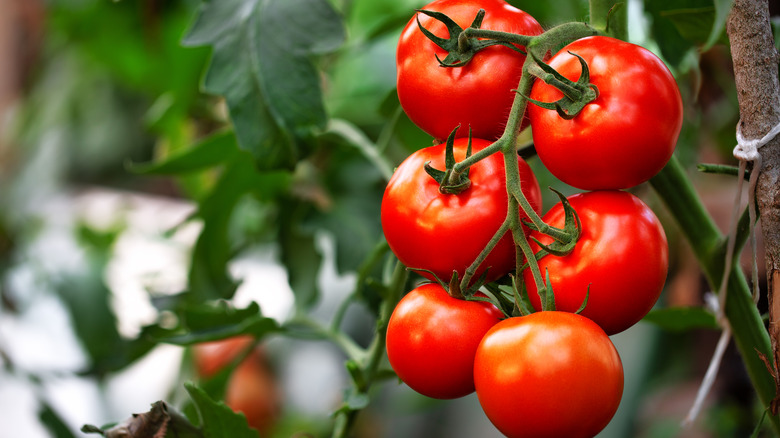The Truth About The Supreme Court Case That Declared Tomatoes Vegetables
It's one of the first fun facts you learn as a kid, something you can repeat endlessly to annoyed aunts and uncles at family gatherings. "Did you know that tomatoes aren't vegetables? They're actually fruits!" As Eufic explains, this is because tomatoes "contain seeds and grow from the flower of the tomato plant," thereby satisfying the botanical definition of "fruit." But what if we told you that, under U.S. law, tomatoes are actually vegetables, not fruits?
The tomato's legal status as a vegetable dates back to an 1893 Supreme Court case, Nix v. Hedden. According to Justia, the case resulted from a dispute surrounding an 1883 Tariff Act signed into law by President Chester A. Arthur. That Tariff Act required shipping companies to pay a 10% tax on imported vegetables, but not on imported fruits.
In the years following the passage of the Tariff Act, some confusion emerged about the legal status of tomatoes. In particular, as The Washington Post reports, John Nix & Co., a produce shipment company with a booming business in New York City, disputed the imposition of an import tax on a shipment of tomatoes from the Caribbean. After all, they argued, tomatoes are fruits under the botanical definition, so why should they be taxed as vegetables? So, per FindLaw.com, John Nix & Co. sued Edward Hedden, the tax collector of the port of New York. Their case, Nix v. Hedden, went all the way to the Supreme Court.
In 1893, the Supreme Court decided to uphold the 'common language' understanding of 'tomato'
When Nix v. Hedden reached America's highest court, the case essentially devolved into a battle of dictionaries. Per Justia, Nix's lawyers centered their arguments on the dictionary definitions of "fruit," "vegetable," and "tomato," reading from Webster's Dictionary, Worcester's Dictionary, and even the Imperial Dictionary. In response, Hedden's legal team read out the definitions of "pea," "egg plant," "cucumber," "squash," and "pepper." Then, Nix's team read the definitions of "potato," "turnip," "parsnip," "cauliflower," "cabbage," "carrot," and "bean." And, per Justia, "No other evidence was offered by either party." (What an exciting case!)
After hearing this riveting testimony, the Supreme Court essentially decided to ignore it. According to The Washington Post, Justice Horace Gray's summary pointed out that, while tomatoes, cucumbers, squashes, and more may technically be fruits in the botanical sense, all are understood to be vegetables in "the common language of the people." And the common language is what really matters when laws are written, not some fancy dictionary definition. Hence, tomatoes are vegetables, at least by law. The precedent set by this case — that common language trumps dictionary definitions — would go on to be cited in three other Supreme Court cases, per Lessons from History, posted at Medium.
So, next time you hear someone say, "Well, actually, tomatoes are fruits," you can retort with, "Not legally speaking!" and tell them all about Nix v. Hedden. You're sure to be the most fun one at the party.

